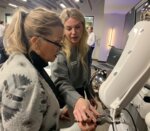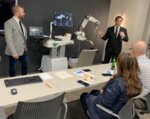

Say hello to the Yomi.
You’ll find the Yomi over at Sandhills Oral Surgery, Periodontics & Dental Implant Specialists working alongside oral surgeons like Dr. Gary Jones and Dr. Joshua Berridge.
“What young boy doesn't want a robot when he grows up?” Jones was saying Thursday evening at the Gerald W. Beatty Education Center, where Jones and Berridge introduced the Yomi to the Fayetteville dental community. “So, we got one.”
The Yomi is, indeed, a robot.
It’s been on the job over at the Boone Trail Extension office since October, and Jones and Berridge say the Yomi already has assisted the Sandhills Oral Surgery team with 80 prosthesis tooth implant surgeries.
“There are lots of health care robots out there,” Jones says.
You may have heard about robotic digital assistance with hip or knee surgeries.
“Robotic-assisted surgeries been around for a long time,” Jones said. “I mean, the market has kind of exploded and you can see for almost any part of the body and any type of procedure they're making robots.”
Neocis, founded by Alon Mozes and Juan Salcedo, is the Miama-based company behind orthopedic robotics, according to its Neocis website.
“Juan, my co-founder, and I had a lot of success in robotic surgery in the orthopedic space,” Mozes says in a website video about the Yomi. “We saw the opportunity to take our knowledge of robotic surgery and bridge it to a different market. With dental implants in particular, we saw a really large underserved market and, more importantly, we knew this technology would be a really good clinical fit for that kind of procedure. We did a lot of homework watching a lot of implant cases, and we just said, ‘Well, we can do so much better. We can make something that’s truly digital and robotic, and really make this better for the dentist and for the patient.’”
Jones is a 58-year-old oral surgeon, and when it comes to dental implants, he’s always on the cutting edge.
“The Yomi is the first and only FDA-cleared robotic device for dental surgery,” Jones said, referencing the U.S. Food and Drug Administration. “We do not want to be left out. So, dentistry needed a robot, and Neocis created it.”
And, he says, his oral surgery practice wanted to be a part of it.
“The surgeon is separate from the patients, but the robotic arms then are manipulated by the hand movements of the surgeon,” Jones said. “Those robotic arms move in ways that the human hands can't move.”
Don’t get the wrong idea, however.
“The surgeon is controlling it,” Jones said.
‘Efficiency and precision’
The Yomi robot is a part of the Sandhills Oral Surgery implant team, and as Jones, along with Berridge, will tell you, the Yomi is there for a better patient procedure and a successful patient outcome.
“Efficiency and precision is the key for this,” said Berridge, a 37-year-old periodontal and dental implant surgeon. “Yomi is a dynamic guidance system.”
With software precision, he says, it can place an implant post or plate with uncanny precision.
Again, the Yomi is just a part of the dental implant procedure.
“We can stop it if we don’t like the placement of the implant, tell it to Yomi and fix it,” Berridge said. “It’s an assistant part of the surgery.”
For most of us, finding ourselves in a dental chair can create some apprehension. Any oral surgeon or dentist is aware, and when a patient makes a sudden move out of that anxiety, the dental surgeon must be able to adapt to a patient’s angst.
What about the Yomi, you may wonder? After all, Yomi is a robot.
No need for concern.
“The robot is in sync during the procedure,” Berridge said. “If the patient moves, the robot moves with it. The tracking arm will move with the patient. It’s all about patient outcomes. We can have a denture (implant) in place,” and a patient “can leave, eat and smile.”
Benefit to the community
Dr. Hershey Bell, founding dean of the coming Methodist University School of Medicine in partnership with Cape Fear Valley Health, was on hand for Thursday’s seminar.
He took in every word of the seminar with an eager and receptive ear.
“I find it exciting that our community is home to the latest technology in oral surgery that will benefit those in need without having to travel away from home,” Bell told CityView. “Also, I was very impressed with Sandhills Oral Surgery and their commitment to education. The new Beatty Education Center is a beautiful facility that enables learning. We look forward to working with Sandhills in the future as part of the development of the Methodist University Cape Fear Valley School of Medicine.”
Haley Harrison, a representative from Neocis, circa 2009, was in attendance to help seminar attendees give Yomi a try for themselves.
I gave Yomi a try, too.
You would not, be assured, want me as your oral surgeon.
“There are six systems in North Carolina,” Harrison said. “But this is the first in Fayetteville.”
Epilogue
Dr. Gary Jones is passionate about his career as a board-certified oral and maxillofacial surgeon.
In 29 years, he has performed, by his count, 18,000 oral surgeries.
“Robot-assisted surgery offers several advantages to both patients and the healthcare community,” Jones said. “Some of these advantages include precision and accuracy with dental implant placement, minimally invasive surgeries, quicker recovery times and a decreased complication rate. The frequency and scope of robot-assisted surgical procedures will continue to increase throughout my career.”
Bill Kirby Jr. can be reached at billkirby49@gmail.com or 910-624-1961.